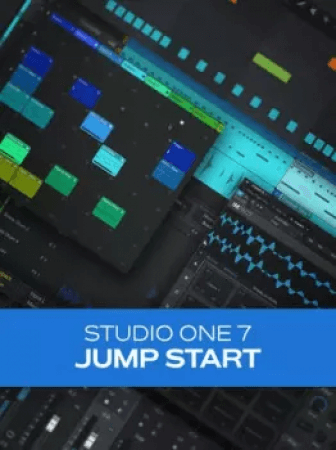Groove3 Studio One 7 Jump Start [TUTORiAL]

P2P | 14 December 2024 | 246 MB
Are you eager to begin using Studio One 7, yet uninterested in deciphering a 300-page guide? You're in the right place. In this Studio One 7 video course, Studio One guru Eli Krantzberg teaches you the basics of Studio One 7 so that you can hit the ground running quickly and get down to doing what you want to do: record your own music. You'll learn how to set up your audio interface, how to navigate your session, record audio and MIDI instruments, add effects, edit tracks, and much more! By the end of this Studio One 7 course, you'll be ready to start recording your first track in Studio One and building your first full song! These videos are designed for new Studio One 7 users.
Eli begins by showing you how to set up an audio interface (which you'll use to record and play back audio on your computer) and a MIDI keyboard controller, with which you can play and record countless "virtual" MIDI instruments, like piano, drums, bass, strings... you name it! Then you'll get the lay of the land in Studio One, so you can see how everything is laid out and learn a few different ways for creating new tracks.
Next, Eli shows you around the timeline, including transport controls, setting up loops, zooming workflows, etc., so you'll know plenty of ways to quickly see what you need and get where you need to get. Then you'll learn how to record a MIDI track using a metronome to count-in while using the input quantize feature (correcting any timing errors automatically while recording) and the record mix mode.
Other topics include recording takes (recording multiple performances to individual layers and switching between them for playback), recording audio (using a microphone to record a live cowbell), arranging and editing (using various tools to cut/paste, move, delete, split, mute, etc.), using patterns (programming MIDI instruments by drawing notes in a grid - very popular with drums), console quickstart (using the mixer to route tracks to effects and more), the Launcher (a non-linear platform for changing the arrangement of your song with a cell- and grid-based workflow), automation (controlling various track parameters, such as volume and panning, over time throughout the song), sharing your music (mixing down your song to a stereo file that can be played anywhere), and more!
Studio One 7 is an incredibly versatile DAW program that can pretty much handle whatever you'd like to do. But it can be a bit intimidating at first when you don't know where to start. This course provides answers to your "where to start" questions and accelerates your journey towards recording exceptional music. See the individual Studio One 7 video tutorial descriptions for more information on everything this course covers and how easily you can get started on your own recordings. Start your recording journey now... Watch "Studio One 7 Jump Start" today!
What You Will Learn:
-Setting up your audio interface and MIDI keyboard controller (for playing/recording MIDI instruments).
-Studio One 7 interface layout and navigation/zooming workflows.
-Recording and editing audio and MIDI sources.
-Using the mixer to add effects, route tracks to buses, etc.
-And much more!
home page
Eli begins by showing you how to set up an audio interface (which you'll use to record and play back audio on your computer) and a MIDI keyboard controller, with which you can play and record countless "virtual" MIDI instruments, like piano, drums, bass, strings... you name it! Then you'll get the lay of the land in Studio One, so you can see how everything is laid out and learn a few different ways for creating new tracks.
Next, Eli shows you around the timeline, including transport controls, setting up loops, zooming workflows, etc., so you'll know plenty of ways to quickly see what you need and get where you need to get. Then you'll learn how to record a MIDI track using a metronome to count-in while using the input quantize feature (correcting any timing errors automatically while recording) and the record mix mode.
Other topics include recording takes (recording multiple performances to individual layers and switching between them for playback), recording audio (using a microphone to record a live cowbell), arranging and editing (using various tools to cut/paste, move, delete, split, mute, etc.), using patterns (programming MIDI instruments by drawing notes in a grid - very popular with drums), console quickstart (using the mixer to route tracks to effects and more), the Launcher (a non-linear platform for changing the arrangement of your song with a cell- and grid-based workflow), automation (controlling various track parameters, such as volume and panning, over time throughout the song), sharing your music (mixing down your song to a stereo file that can be played anywhere), and more!
Studio One 7 is an incredibly versatile DAW program that can pretty much handle whatever you'd like to do. But it can be a bit intimidating at first when you don't know where to start. This course provides answers to your "where to start" questions and accelerates your journey towards recording exceptional music. See the individual Studio One 7 video tutorial descriptions for more information on everything this course covers and how easily you can get started on your own recordings. Start your recording journey now... Watch "Studio One 7 Jump Start" today!
What You Will Learn:
-Setting up your audio interface and MIDI keyboard controller (for playing/recording MIDI instruments).
-Studio One 7 interface layout and navigation/zooming workflows.
-Recording and editing audio and MIDI sources.
-Using the mixer to add effects, route tracks to buses, etc.
-And much more!
home page
Only registered users can see Download Links. Please or login.


No comments yet